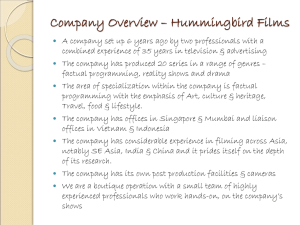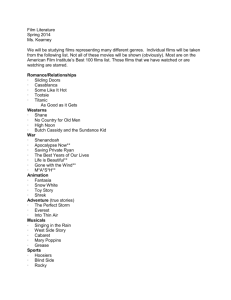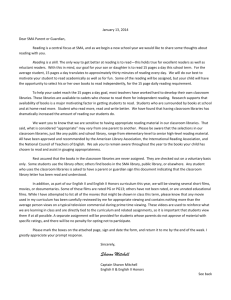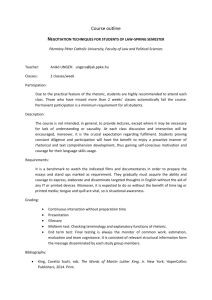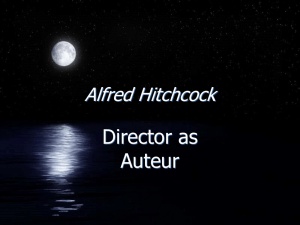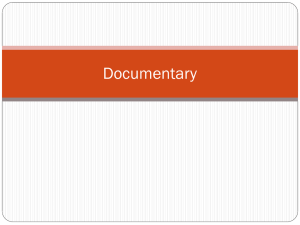Understanding the Contemporary World
advertisement
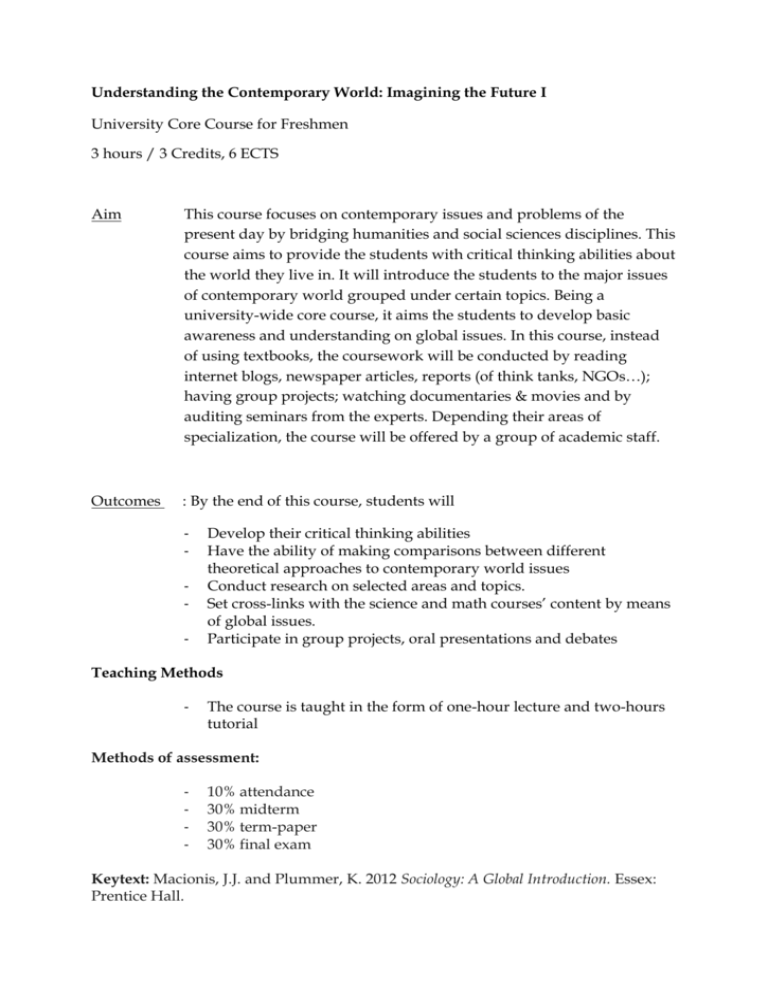
Understanding the Contemporary World: Imagining the Future I University Core Course for Freshmen 3 hours / 3 Credits, 6 ECTS Aim This course focuses on contemporary issues and problems of the present day by bridging humanities and social sciences disciplines. This course aims to provide the students with critical thinking abilities about the world they live in. It will introduce the students to the major issues of contemporary world grouped under certain topics. Being a university-wide core course, it aims the students to develop basic awareness and understanding on global issues. In this course, instead of using textbooks, the coursework will be conducted by reading internet blogs, newspaper articles, reports (of think tanks, NGOs…); having group projects; watching documentaries & movies and by auditing seminars from the experts. Depending their areas of specialization, the course will be offered by a group of academic staff. Outcomes : By the end of this course, students will - Develop their critical thinking abilities Have the ability of making comparisons between different theoretical approaches to contemporary world issues Conduct research on selected areas and topics. Set cross-links with the science and math courses’ content by means of global issues. Participate in group projects, oral presentations and debates Teaching Methods - The course is taught in the form of one-hour lecture and two-hours tutorial Methods of assessment: - 10% attendance 30% midterm 30% term-paper 30% final exam Keytext: Macionis, J.J. and Plummer, K. 2012 Sociology: A Global Introduction. Essex: Prentice Hall. Week 1 (8 - 10 October): Overview of the course: - Topics, assessment methods - Writing a social science and humanities paper (resources, references) ------------------------------ Week 2 (13 – 17 October): What is this thing called science? Modernity, Science, Social Science Suggested reading: 1. Chalmers, A.F. 1999 What is This Thing Called Science? Indianapolis: Hackett Publishing Company 2. McGrew, D., Hall, St. and Held, D. 1992 Modernity and its Futures: Understanding Modern Societies. London: Polity Press 3. Hall, st. and Gieben, B. (eds.) 1993 The Formations of Modernity: Understanding Modern Societies an Introduction. London: Polity Press. Films/Documentaries: 1. Life Story 2. Frankenstein 3. 1984 Week 3 (20 – 24 October): Who is Emile Durkheim, Karl Marx and Max Weber? Is Capitalism a rational scientific system? Are we heading to our destruction or to our happiness? 1. Durkheim, E. 1982 The Rules of Sociological Method. New York: The Free Press. 2. Durkheim, E. 1968 The Division of Labour in Society. New York: The Free Press. 3. Durkheim, E. 1992 Professional Ethics and Civic Morals . London and NewYork: Routledge . 4. http://archive.org/details/protestantethics00webe 5. Marx, K. 2010[1867] The Capital(Vol.I) http://libcom.org/library/capital-karl-marx 6. Marx, K. and Engels, F. 1962 Selected works. Vol. 1. Moscow: Foreign Languages Publishing House. 7. Marx, K. and Engels, F. 1962 Manifesto of the Communist Party. Moscow: Foreign Languages Publishing House. 8. Weber, M .1948 Essays in Sociology. New York: Oxford University Press. 9. Weber, M. 1950[1905] The Protestant Ethic and the Spirit of Capitalism Films/Documentaries: 1. Modern Times 2. Gattaca 3. 2001: A space odyssey Week 4 (27 – 31 October): Postmodernity: Is this a pipe? Did the gulf war actually happen? Suggested reading: 1. McGrew, D., Hall, St. and Held, D. 1992 Modernity and its Futures: Understanding Modern Societies. London: Polity Press 2. Hall, st. and Gieben, B. (eds.) 1993 The Formations of Modernity: Understanding Modern Societies an Introduction. London: Polity Press. 3. Baudrillard, J. 1995 The Gulf War Did Not Take Place. Bloomington: Indiana University Press Films/Documentaries: 1. Inception 2. Midnight in Paris 3. The Matrix Week 5 (3 – 7 November): Research and Society: How World War I played a role in the development of social science research methodology? Suggested reading: 1. Bryman, A. 2008 Social Research Methods. Oxford: Oxford University Press. 2. Gray, A. 2003 Research Practice for Cultural Studies: Ethnographic Methods and Lived Cultures. London: Sage Publications. 3. O’ Reilly, K. 2011 Ethnographic Methods. London: Routledge. 4. Marcus, G. 1995 Ethnography In/Of the World System: The Emergence of Multi-Sited Ethnography. Annual Review of Anthropology 24: 95-117 Films/Documentaries: 1. Tales from the Jungle: Bronislaw Malinowski Week 6 (10 – 14 November): Capitalism a Love Story: Modern States, Market Economy, Globalization, and the Wealth of Nations Suggested reading: 1. Gellner, E. 2009 Nations and Nationalism. New York: Cornell University Press. 2. Weber, M .1948 Essays in Sociology. New York: Oxford University Press. Films/Documentaries: 1. Capitalism: A Love-story Week 7 (17 – 21 November): What is debtocracy? From Great Depression to the Oil Crisis and the Global Financial Crisis of 2008: Crises and Problems of the Global Market Economy Suggested reading: 3. Weber, M. 1950[1905] The Protestant Ethic and the Spirit of Capitalism http://archive.org/details/protestantethics00webe 4. Marx, K. 2010[1867] The Capital(Vol.I) http://libcom.org/library/capital-karl-marx Films/Documentaries: 1. Catastroika 2. Debtocracy 3. The shock doctrine Week 8 (24 – 28 November): Mid-terms ------------------------ Week 9 (1 – 5 December): Environmental issues: Let’s play a game! History of environmentalism, environmental summits, major environmental problems, logic and limits to growth Suggested reading: 1. Beck, U. 1992 Risk Society: Towards a New Modernity. London: SAGE. 2. Hannigan, J. 2006 Environmental Sociology: A Social Constructionist Perspective. London: Routledge. 3. Ignatow, G. 2005b ‘Economic Dependency and Environmental Attitudes in Turkey’. Environmental Politics 14(5): 648-66. 4. ─── 2007 Transnational Identity Politics and the Environment. Lexington Books. 5. ─── 2008a Globalizations and the Transformation of Environmental Activism: Turkey since the 1980s. Globalizations 5(3):433-447. 6. ─── 2008b Transnational Environmentalism at Europe’s Boundaries: Identity Movements in Lithuania and Turkey. Current Sociology 56(6):845864. 7. Kousis, M. and Eder, K. 2001 Introduction: EU policy-making, local action, and the emergence of institutions of collective action. A theoretical perspective on Southern Europe. In: Kousis, M and K Eder (eds.) Environmental Politics in Southern Europe: Actors, Institutions and Discourses in a Europeanizing Society. Dordrecht: Kluwer Academic Publishers. 8. Kousis, M. 2004 Greece. In Rootes, C. (ed.) Environmental Protest in Western Europe. Oxford: Oxford University Press. 9. Lin, J. and Mele, C. 2005 The Urban Sociology Reader. 10. Özdemir, İ. 2003 The Development of Environmental Consciousness in Modern Turkey. In: Richard Foltz (ed.), Environmentalism in the Muslim World. Boston: MIT Press. 11. Seferiades, S. and Johnston, H.2012 Violent Protest, Contentious Politics, and the Neoliberal State. London: Ashgate. 12. Sutton, Ph. 2007 The Environment: A Sociological Introduction. London: Polity Press. 13. Voulvouli, A. 2009 From Environmentalism to Transenvironmentalism: The Ethnography of an Urban Protest in Modern Istanbul. Oxford: Peter Lang Publications. 14. ─── 2010 Leftism, Secularism, Transnationalism and Localism: The Identities of an Urban Protest in Contemporary Istanbul. Ethnologia OnLine (http://www.societyforethnology.gr/site/pdf/TheidentitiesofASG.pdf). 15. ─── 2011a Transenvironmental Protest: The Arnavutköy anti-bridge Campaign in Istanbul. Environmental Politics 20(6):861-878. 16. ─── 2011b Grassroots Mobilisation in Turkey: The Transnational Character of Local Environmental Protests. Films/Documentaries 1. Avatar 2. An inconvenient Truth Week 10 (8 – 12 December): The Urban environment: What is the relationship between Julia Roberts and the Third Bosphorus Bridge? Population increase and urbanization, Gobal cities, Urban struggles Suggested reading: 1. Sassen, S 2001 The Global City Princeton, Princeton University Press 2. Voulvouli, A. 2009 From Environmentalism to Transenvironmentalism: The Ethnography of an Urban Protest in Modern Istanbul. Oxford: Peter Lang Publications. 3. ─── 2010 Leftism, Secularism, Transnationalism and Localism: The Identities of an Urban Protest in Contemporary Istanbul. Ethnologia OnLine Films/Documentaries: 1. Kent Suclari Week 11 (15 – 19 December): What is Civil Society? NGOs, Social Movements (Definitions, local, national and global NGOs, local, national and global social movements) Suggested reading: 1. Tilly, C. 2004 Social Movements 1768 – 2004. Boulder: Paradigm Publishers. 2. Voulvouli, A. 2009 From Environmentalism to Transenvironmentalism: The Ethnography of an Urban Protest in Modern Istanbul. Oxford: Peter Lang Publications. 3. ─── 2011a Transenvironmental Protest: The Arnavutköy anti-bridge Campaign in Istanbul. Environmental Politics 20(6):861-878. 4. ─── 2011b Grassroots Mobilisation in Turkey: The Transnational Character of Local Environmental Protests. International Journal of Academic Research 3(1): 881 - 888. 5. Seferiades, S. and Johnston, H.2012 Violent Protest, Contentious Politics, and the Neoliberal State. London: Ashgate. Films/Documentaries: 1. This is what democracy looks like Week 12 (22 – 26 December): Technology: From antiquity to contemporary technology (computer technologies, robotics, nanotechnologies, genetics etc) Suggested reading: …………………………………………….. Films/Documentaries: 1. 2. 3. 4. Contact The time Machine Back to the Future ET: The Extra-terrestrial Week 13 (29 December – 2 January): Media: From Gutenberg to the world wide web (internet, social networks) Suggested reading: 1. McLuhan, M. 1964 Understanding Media London: Routledge & Kegan Paul 2. Williams, K. Understanding Media Theory. New York: Bloomsbury. 3. Thornham, S., Bassett, C. and Marris, P. 2009 Media Studies: A Reader. New York: NYU Press. 4. Miller, D. 2011 Tales from the Facebook. London: Polity Press. Films/Documentaries: 1. 2. 3. 4. You ‘ve got mail The social network Jobs The revolution will not be televised Week 14 (5 – 9 January): Art and society: Is prettiness universal? The globalization of art Suggested reading: 1. Appadurai, Arjun. 1990. “Disjuncture and Difference in the Global Cultural Economy.” Public Culture 2: 1-24. 2. Griswold, Wendy. 1992. "The Writing on the Mud Wall: Nigerian Novels and the Imaginary Village." American Sociological Review 57: 709-724. 3. Kim, Jeongmee. 2003. “The Funding and Distribution Structure of the British Film Industry in the 1990s: Localization and Commercialization of British Cinema towards a Global Audience.” Media, Culture & Society 25: 405-413. 4. Mukerji, Chandra. 1979. “Mass Culture and the Modern World-System: The Rise of the Graphic Arts.” Theory & Society 8: 245-268. 5. Penkakur, Manjunath and Radha Subramanyam. 1996. “Indian Cinema beyond National Borders.” Pages 67-82 inNew Patterns in Global Television: Peripheral Vision, edited by John Sinclair, Elizabeth Jacka, and Stuart Cunningham. Oxford: Oxford University Press. Films/Documentaries: 1. The red violin Week 15 (12 – 16 January) Revision of the course – Submission of term-papers ---------------------
